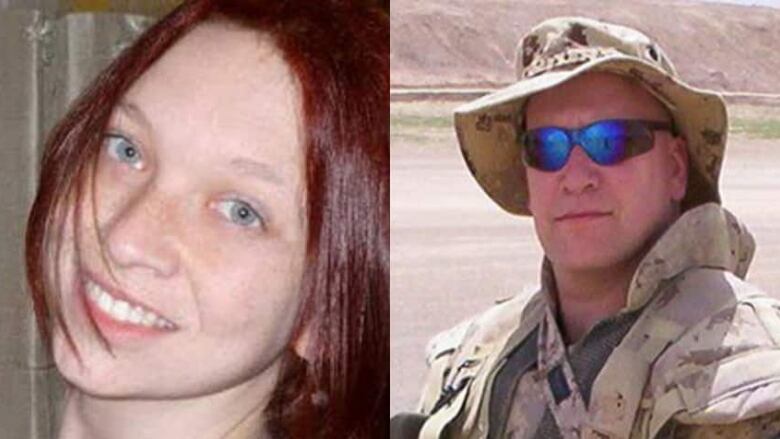PTSD left Howard Richmond's brain 'a bit scrambled,' court hears
Murder trial jurors watch police video from day Melissa Richmond reported missing

A Canadian soldier charged with first-degree murder in the death of his 28-year-old wife told policethat his post-traumatic stress disorder had left his brain "a bit scrambled"and that he'd slept in the spare bedroom the night before he reported her missing.
Jurors at the murder trial of Howard Richmond watched a two-hour video interview Friday afternoon between Howard Richmondand OPP Det. Const. Michael Redmond, taken on July 25, 2013 the same day he told police about her disappearance.
MelissaRichmond'sbody was foundin a ditch near Ottawa's South Keys Shopping Centre three days lateron July 28, 2013.
Although he admitted he killed his wife at the outset of his trial, Howard Richmondhas pleaded not guilty, and his lawyers have argued he was not criminally responsible because he was suffering from PTSD caused by six tours of duty for the Canadian Armed Forces.
-
Howard Richmond admits to killing wife while suffering fromPTSD
-
Melissa Richmond's lover 'scared' about soldier husband's reaction
In the video, Richmond is seen tellingRedmondthat while hewas willing to answer any questions, hisPTSDmeant his "brain is a bit scrambled."
Richmond told the detectivethat his wife was "rock hard," however, when it came to supporting him through hisPTSD. She wouldoften help him brush his teeth, he said,and wouldtake him by the hand into the shower.
I knew it was my PTSD...it made me crazy.-Howard Richmond
The night before she disappeared, Richmond said he and his wife had a "discussion" about an upcoming march he was going to take part in, and that she didn't want him to do it, according to the police interview.
That conversation left him "rattled",so he slept in the spare roomsomething he often did because ofPTSD-inducednightmares,Richmond said. His wife went out for a drive to clear her head, he toldRedmond.
Was in 'complete panic'
Richmond said he didn't realize until the next day that his wife hadn't returned home.
"I was in a complete panic about where she was," he told the detective."I knew it was myPTSD...it made me crazy"
WhenRedmondasked, on a scale of one to ten, how strong their marriage was, Richmond replied"right now, with myPTSD, it's a three or four."
He then added that, in recent days,their marriage had actually been more solid than it had been in awhile.
"This last week has been one of the best weeks we've everhad. We're working on long-term plans, not just two or three years," he said on the video. "We were having some intimate times together."
Wanted to thank him 'properly'
Before watching the police interview video, jurors heard from Bruce Sass, who testified that Howard Richmond offered him a piece of his wife's jewelry as a thank-you gesture for finding her car.
Sass told theOntario Superior Court ofJustice that onJuly 27, 2013, he saw a Facebook page asking for the public's help in finding Melissa Richmond.
The Facebook page included a description of her car: a gold Chrysler Sebring with vanity plates, Sass testified.Hours later, Sass was working his shift asa waiter at the shopping centre's Denny's when he spotted that same car outside the restaurant, he told court.
"This is unbelievable. I just saw the post three hours ago, and now I see the car...I was dumbfounded," Sass testified.
Sasssaid he contacted police and the people who'd set up the Facebook page. One day later, Melissa Richmond's body was found.
Sass testified that he also contacted Howard Richmond through Facebook and offered his condolences. He recalled Richmond writing back that he was "grateful" and that without his help Melissa "might still not be found."
Sass said that he remembered Richmond writing he wanted to meet him and thank him "properly," by giving Sass's daughter a piece ofhiswife's jewelry "so she knows how you have touched the hearts of my family."
TheFacebook messages have not yet been seen by the court.
Richmond was arrested several days after that correspondence, Sass testified, so they never met.
Tours of duty led to PTSD: defence
Richmond completed six tours of duty for the Canadian Armed Forces:three in Afghanistan, two in Bosnia and one in Cyprus.He remains a Warrant Officer employed as a geomatics technician.
His defence has argued that it was his armed forces' experience that led to his post-traumatic stress disorder, and as a result Richmond is not criminally responsible for stabbing his wife to death with a knife and a screwdriver and dumping her body in a ditch in the city's south end.
The court has also heard that the couple's marriage had been deteriorating and that Melissa Richmond was having an affairat the time of her death.
The trial continues Monday.












_(720p).jpg)


 OFFICIAL HD MUSIC VIDEO.jpg)
.jpg)



























































































